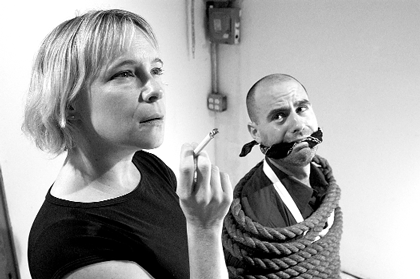By Davida Singer
Former NYU student with new play at the Flea
Family plays about life in Russia and Louisiana have been Dmitry Lipkin’s specialty since he completed the graduate writing program at NYU over ten years ago. Lipkin’s own family moved from Moscow to Baton Rouge when he was 11, and he started penning plays regularly after co-founding The Playwrights Collective with a small group of his former NYU classmates.
“I couldn’t fit into the professional world and was immediately drawn to theater,” recalls Lipkin, now 35, and living with his wife and baby in L.A. “I loved that in playwriting you could write what you wanted. It felt much freer than screen plays and more exciting.”
The body of Lipkin’s work includes “The Elephant Play,” “Baton Rouge” at E.S.T., and the critically hailed “Cranes,” produced by The New Group in 1999. His current offering, “The Wanderer,” which was first presented at the O’Neill in Connecticut, has its New York premiere this week at The Flea Theater. The play, about an otherworldly being who drops out of the sky and into Brighton Beach, is written in Lipkin’s fable-like style, and has already won the Primary Stages Bug ’n’ Bub Comedy Award for 2001.
“Usually I stumble into a project and it becomes a product of the thing telling me what it is,” Lipkin says. “Much of my work has been quite experimental. This play I originally wrote because I wanted something light and fun — even a bit more commercial — after a previous serious work. Originally, it was about Russian gangsters, but after the first draft I realized it had something metaphysical. There was this character, Pasha, I didn’t understand, but felt he held the clue to what the play was all about. It all clicked one night in the bathtub that he was ‘otherworldly,’ and everything came from there.”
According to Lipkin, “The Wanderer” was strongly influenced by Caryl Churchill’s “The Striker,” which he had seen at The Public, and which also had a shape-shifting character at the center of the piece.
“Mine is a stylish comedy,” he explains, “with two songs in it. It takes place in Brighton Beach, and examines the lives of an extended family of recent Russian immigrants, struggling with their lives in the U.S. In the midst of this, a being falls from the sky. He’s not sure who he is, but presents himself as a scaffolding worker who then changes incarnations, and helps this family out materially and spiritually.”
A light and suggestive set enhances the play’s ambiance, as do the original songs, with lyrics by Lipkin and music by actor Brian Gottesman. Director Adam Melnick (Chekhov Now Festival), the artistic director of LITE, which is producing the show, is also a personal friend of Lipkin.
“He’s great because he’s very visual,” says the writer, “but committed to storytelling, and he’s also precise about what he wants. The essence here is on two levels. It’s about being an immigrant and about things we can’t see, but that happen nonetheless. I believe there are things we don’t know about that are out there, and I believe in an epiphany — a moment of truth — where life makes sense. The main character is a woman of about 30, an immigrant who is unclear about where she belongs, and I take her through this moment.”
Getting financial backing and a run for “The Wanderer,” were the only obstacles in this project, and Lipkin notes that the play’s cast of eight might have had something to do with it. Now that his piece has found a New York home, the author looks forward to what he hopes will be an unexpected ride for his audience.
“I always love to trick them into believing something is this, and then to disorient them,” he says. “I think that’s actually how these moments of artistic epiphany can happen to sneak up on them and affect them deeply.”
Read More: https://www.amny.com/news/heady-brew-of-starbucks-spirituality-burningman/






































